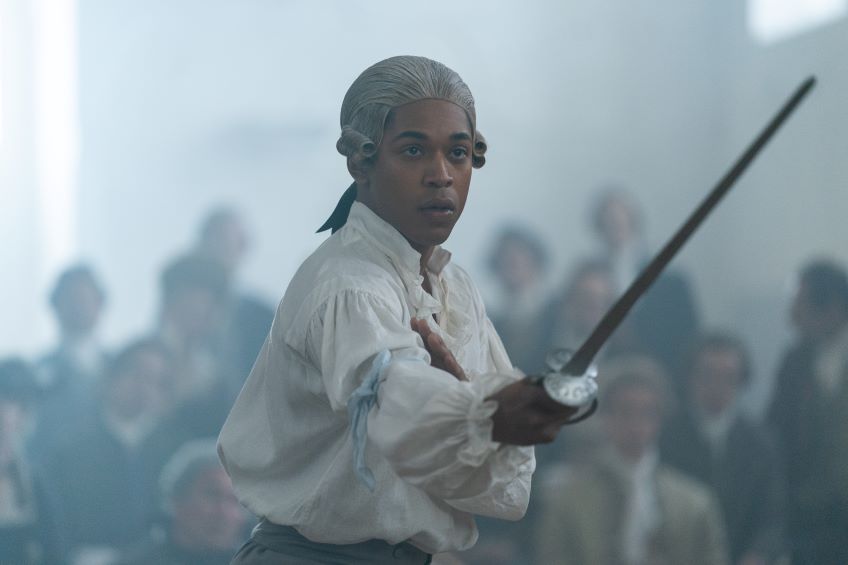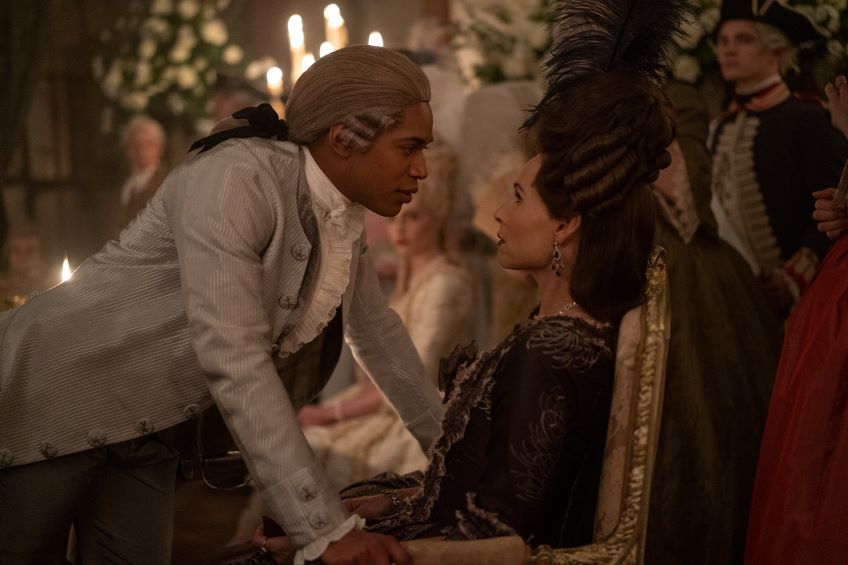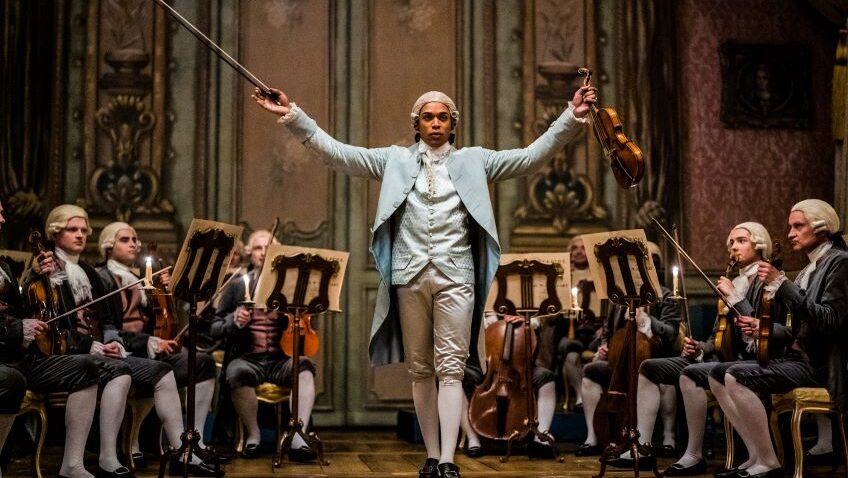Joyce Glasser reviews Chevalier (June 9th) cert. 12A, 107 mins. In cinemas.
If you sat through the most complete version available of Abel Gance’s 1927, 5-hour, masterpiece, Napoléon, released in 2017, you really should see Chevalier. In a captioned coda, director Stephen Williams (who was born in Kingston, Jamaica) draws a link between the two heroic Frenchmen: one expunged from history by the other. Napoléon I then expediently reinstated slavery in colonies like Guadeloupe, where Joseph had been born in 1745 to a white plantation owner and his wife’s Senegalese teenage maid, Nanon (Ronke Adekoluejo).
Although Williams’ film, with a script by Stefani Robinson, is no match for Gance’s masterpiece, it is an important first step in rewriting history. And the film explains why Napoléon might have felt threatened by a celebrated swordsman, composer, musician and Revolutionary leader whose status of Chevalier was rescinded by the woman who first bestowed it, Queen Marie Antoinette (Lucy Boynton).
Joseph’s father Georges de Bologne Saint Georges (Jim High) was unusual for white 18th century planters who raped their slaves. While being legally married to a white woman, Georges recognised his illegitimate mixed-race son and gave him his name.
When the film begins, Georges brings the seven-year-old boy (played by Reuben Anderson) to France for his education, instilling in Joseph the necessity of always being excellent. He understands that he must be better than the white students at everything if he is to be accepted in high society. The racist headmaster is dismissive of the Black child but quickly recants after hearing Joseph play the violin.

At thirteen, Joseph is enrolled at the prestigious La Boëssière’s Academy in Paris, to perfect his fencing skills, while polishing his dancing and horsemanship. Williams real life episode when Joseph (now played by Kelvin Harrison Jr), challenges and beats the famous fencing master Alexandre Picard who had called him “Boëssière’s upstart mulatto” in public. The Queen (Boynton), who is present, is as impressed by Joseph’s confidence, looks and swagger as by his talent, and knights him, “Chevalier.”
The story now focuses on Joseph’s life as a celebrated court violinist and composer who shows up at the same cultural soirées as Marie Antoinette and is, to an extent that he will test, protected by her. Society women and opera singers like La Guimard (Minnie Driver, excellent) throw themselves at the exotic young favourite whose insecurity is masked by an aloofness bordering on arrogance.
But in his quest for acceptance on his own terms, Joseph learns that Societies position as man of the moment is precarious. When he rejects the much older La Guimard’s demeaning advances, her pride is wounded. While openly praising Joseph’s musical skills, she will add her name to a list of singers who will boycott the Opera if Joseph, “a man of colour,” is made head conductor.
But as Joseph confesses to the only woman he loves, Mary Josephine (Samara Weaving), an aspiring opera singer and wife of the king’s powerful spymaster, the Marquis de Montalembert (Marton Csokas), French law prohibits him from marrying freely. The relationship with Mary Josephine becomes the major subplot in which Joseph’s untenable position in society as a black man, and Mary Josephine’s as a woman are played out. Neither are free to fulfil their respective career potential or their amorous desires.

History and the film record the fate of the son Joseph has with his white mistress, a tragedy that coincides with the successful production of Joseph’s opera comic that he writes and conducts for the competition to head the Royal Opera. It is at this turning point that Joseph realises being excellent is not enough.
He joins the revolutionary movement of his friend and patron Philippe ‘Égalité,’ the Duke of Orleans (Alex Fitzalan) and, (somewhat unbelievably), with Mary Josephine frequents the cafés where revolutionary ideas are discussed. Around this time Joseph finally stops resenting his uneducated mother, who Georges had moved to Paris to live with Joseph. Joseph starts to embrace his African-Creole heritage and meet other likeminded men of colour who will join him when Joseph heads up the French Revolution’s only all-Black regiment.
Handsomely produced with glorious costumes and sets that delineate levels of class and wealth, and beautifully scored, Williams and Robinson manage to cover all the key points, but with expediency and often crude dialogue rather than artistry. Harrison Jr is talented enough to convey Joseph’s conflicting emotions without the need to turn him into an insufferable competitor.
The filmmakers draw in real life characters like the composers-conductors like Mozart, Gluck – Joseph’s rival for the Paris Opera job – and show Joseph to be aggressively adversarial in his relationships with these musicians when there is no evidence of this. The Marquis de Montalembert is a terrifying adversary but he is drawn into the plot in scenes clearly made-up for dramatic effect, as when he himself travels across Paris with the Queen to interrupt Joseph conducting his Black orchestra. These scenes spark of bravura but lend the aura of cliché to a story that is so remarkable it needs no embellishment.




